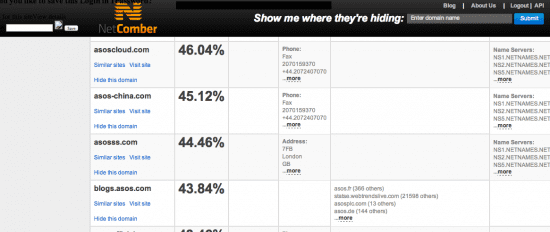An interview with ex-Googler Andre Weyher
You may have noticed we enjoy reviewing tools that help marketers manage their online marketing. In most cases, particularly for search marketing, new tools are variants on existing tools for keyword or backlink analysis. So, I was interested to hear more about Netcomber since it offers a different type of service, still closely related to search, but also with potential for applying more generally for reputation management and affiliate marketing. Here I talk to Andre Weyher about how the Netcomber service has evolved and how it can be used by brands.
Q. What was your inspiration for developing Netcomber?
NetComber is the result of my personal wish of making the Internet a more transparent place. After working in Google for close to 5 years, the bulk of that period in the Search Quality team, I learned a lot about the workings of search engines.
When I moved to Australia I met a very talented web-miner and together we created the tool. We want to reveal all the connections between websites, even the carefully hidden ones, we strongly believe in the free flow of information and competitive intelligence. Search engines’ main trade is gathering and distributing of information. We want to make sure that this information is available to anyone.

Q. How will your new service help marketers?
The main goal is to deliver high-end online intelligence, something that marketers need more and more in such a competitive industry as SEO and online marketing is becoming.
We hope to give our users insights into how search engines see your site ownerships cluster and how they hunt spam. After all, if one website engages in spammy techniques, it’s likely that the owner does the same for his other sites. Information like this is used to demote or even remove certain spammy ownership clusters from the index.
There are more ways in which savvy marketers can use the data to their own benefit, so far we have received loads of feedback from our users who learn a lot about what their competitors are up to online, the tool uncovers websites that haven't been launched yet, so it gives you a unique insight in what’s coming up next. Not to mention that we offer very useful information for SEOs. What links are your competitors after? Which networks should you avoid as they are getting filled up with low quality links? Are there linking opportunities that you have not yet thought of?
Q. Are there any types of company or industry sectors you think it will particularly be useful for?
Affiliate marketers can use the data to find new ways of making money. We’ve had lawyers using the tool to find out projects of their adversaries in court and even investigative journalists who are writing about a certain website or want to find out what their subject is up to on the net. The ways in which the data is used has actually surprised us. We even had a manager in one of the bigger Online Agencies tell us he uses the tool to keep track of his clients’ domain portfolio. Financial institutions use the data to assess a person’s credit score. Generally anyone who needs to know what others are up to on the net.
Q. What tech have you based the service on and what coverage and freshness does this give you?
For a long time we had coverage of 20 million sites crawled and mapped in our database, during this time the service was in BETA. Recently, we’ve implemented a database of close to 200 million sites with our next database covering 500 million, so the coverage is very comprehensive!
The technology and algorithm we use to calculate ownership is quite complex. We use close to 3000 factors like numerous account IDs, hosting details, whois data and even coding style of the developer to determine the probability of ownership. Of course, each of these factors alone would not paint a realistic and probable picture of ownership, but weighted and cross-referenced against each other, they form a much more precise probability that even uncovers the sites the owner wants to hide by setting the Whois data to a higher privacy, for example.
Q. How do you see it evolving in future?
At the moment we are still very heavily working on perfecting the logic and database, but we’ve also got a lot of valuable feedback on things to improve on and features to create. I think the future will hold a lot of customisation of the data, depending on who is looking and what it is exactly they want to learn. Also, features like exporting to CSV are just around the corner and our users will soon have the possibility to get the data via an API solution, this will be of special interest to domainers, hosting companies, domain registrars and large agencies.





